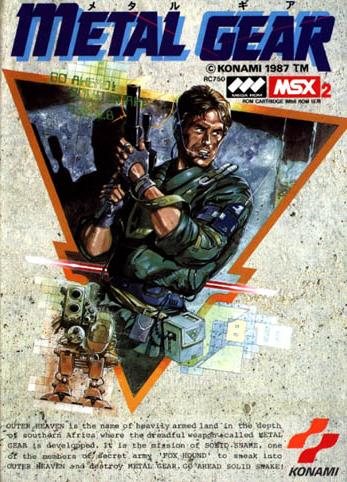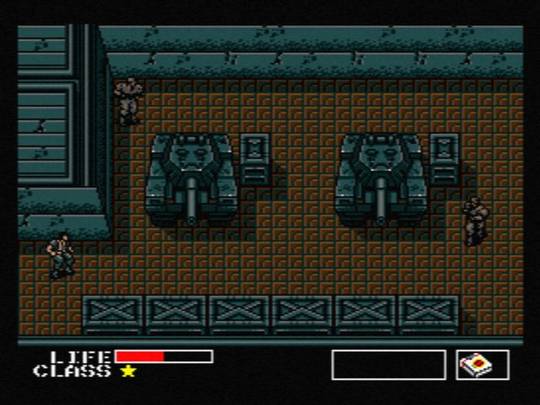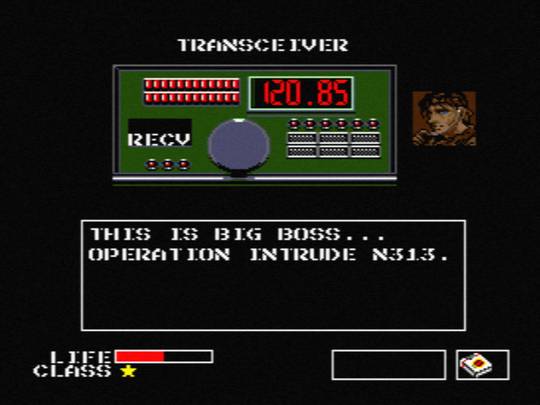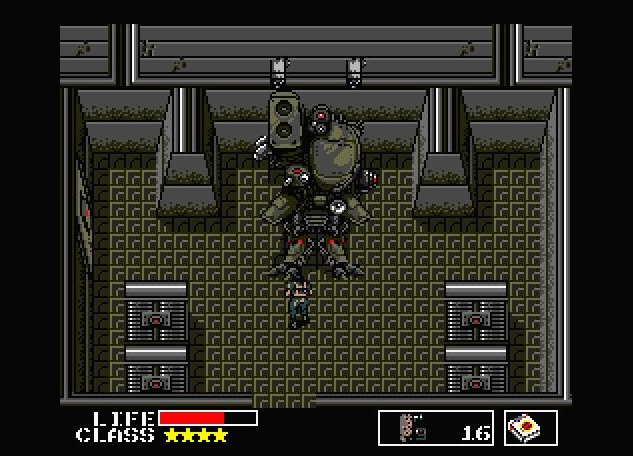The Metal Gear video game franchise has a reputation for excellence in storytelling and innovative gameplay. It is also comically difficult. Join Deadshirt Editor-in-Chief and absolutely terrible video gamer Dylan Roth as he plays through the entire Metal Gear canon in anticipation of the long-awaited Metal Gear Solid V: The Phantom Pain, out this fall.
Like most Americans, my entry point into Hideo Kojima’s acclaimed Metal Gear espionage video game series was 1998’s Metal Gear Solid for the original PlayStation. I have fond memories of wasting away hours in my cousin’s basement, watching him play through the story and being stunned by the gorgeous (for 1998) cutscenes and the complexity of the story. I have less fond memories of my own attempts to play through the game—I never even owned a game system until 2007, so my own gaming skills left (and still leave) much to be desired.
But my own video game ineptitude is only partly to blame for my repeated failure. Metal Gear Solid is a game that attempts to confound the player by breaking from well-established video game rules and tropes, and by occasionally breaking the fourth wall and requiring you to do something outside the world of the game in order to complete a mission. Metal Gear Solid is equal parts action-adventure and brain teaser, but it rewards the player’s hard work with a complex story, interesting characters, and an exciting variety of gameplay.
The true opening chapter to the franchise, however, is simply hell.
Metal Gear was originally released for the MSX2 computer in 1987, available only in Japan and Europe. While a bastardized NES port was released in the States in 1988, the original version of Metal Gear only became available in the US in 2005, as a special feature for the deluxe version of Metal Gear Solid 3 on the Playstation 2. It’s also now available on the Wii Virtual Console. For my purposes I played the version that comes with MGS3, though I imagine the Wii release is functionally identical.
Story
You play as Solid Snake, the latest addition to the US black ops unit FOXHOUND. Each member of FOXHOUND is a versatile, elite soldier but typically has their own specialty; your specialty is infiltration. You’re Sneaky Guy.
Your mission is to infiltrate a mercenary base in South Africa called Outer Heaven, where your friend and comrade Gray Fox is being held. This isn’t just a rescue mission, however—Fox has discovered that Outer Heaven is also in possession of Metal Gear, a walking battle tank with the ability to launch a nuclear missile from anywhere. Snake must free Gray Fox, a slew of other hostages, and the scientist who’s been coerced into building the titular ultimate weapon for the bad guys, plus end the threat of Metal Gear.
SPOILERS AHEAD FOR A GAME THAT CAME OUT BEFORE YOU WERE BORN:
Turns out that the guy behind Outer Heaven and Metal Gear is none other than your own commanding officer, Big Boss. This would be a shocking betrayal, except that you, the player, don’t really know Big Boss very well. In fact, none of the characters really feel like characters in Metal Gear. Like in later installments, Snake keeps in touch with a handful of people via radio, but unlike in Metal Gear Solid, in which you have improbably long conversations with each companion until you pretty much know their entire life story, the transmissions in Metal Gear are purely practical.
While this really isn’t surprising since Metal Gear is an 8-bit early computer game as opposed to a fifth-generation console game, it is disappointing given the gravity with which these events are discussed in Metal Gear Solid. For instance, MGS implies a special friendship between Snake and Gray Fox, but they barely exchange words in the original game. It’s not unlike going back and revisiting Silver Age X-Men from the perspective of a modern day reader—experiencing the adventures of the original five X-Men is a lot less interesting than hearing their current incarnations reminisce about them.
Metal Gear is likewise missing all of the philosophical musings on the nature of war, politics, genetics, and love. (Again, like with X-Men, the themes that make the series great just aren’t there at the outset.) Is it fair to expect these elements from a game made in 1987? Not really; this kind of complexity wasn’t expected from a video game during this era. But it’s still disappointing, since so much of what makes Metal Gear Solid great isn’t tied to graphics or technology, and there’s no technical reason why there couldn’t have been a little more text to read in Metal Gear.
Gameplay
Metal Gear is an 8-bit top-down adventure game in which you, as Solid Snake, navigate through a paramilitary fortress while trying not to be seen. A groundbreaking concept for its day, Metal Gear focuses not on combat but on avoiding combat, a far more realistic depiction of a lone soldier breaching a well-guarded facility than running and gunning your way through. You can still hold your own in a firefight, but you’re much better off being patient and waiting for the right moment to slip past an enemy soldier unnoticed.
The stealth and combat portions of Metal Gear are simple and very playable, and remarkably unchanged in later installments. Sure, you can’t crouch or crawl, but your best option in subduing an enemy is still sneaking up behind him and knocking him out silently. (Visually, you’re just punching him three times, but your imagination can fill in the graphical gaps.) Aiming and firing your weapon is a little challenging, as it should be. You have access to mines and rockets, and C4 to knock down weak walls and discover hidden rooms.
And yes, you can hide in a cardboard box to evade detection.
Unfortunately, there are also a lot of elements in Metal Gear that are needlessly, deliberately frustrating. As you would expect, there are several security levels, and you acquire higher level security cards to open more doors as you progress through the game. The trouble is that, rather than each new card opening all doors up to a certain security level, each of the eight key cards only opens doors specific to that security level. That means that each time you encounter a new door you’ll have to try each key until you find the one that works. It’s very time consuming, especially since doors close behind you and it’s very difficult to remember which key opens which door. The doors are unmarked and identical, so unless you have an exceptional memory you’re going to waste a tremendous about of time fumbling through your keys like you’re being chased by an axe murderer in a horror movie. (Note: sometimes you actually will do this while under fire.)
There are several stages of the game that are impossible to complete without a great deal of trial and error. For instance, there is a series of four screens which each has a pair of large trapdoors to avoid. There is no way to anticipate where the trapdoors will be; you just have to walk the room, spring the trap, fall to your death, and start over from the beginning of the room. Avoiding the traps isn’t even just a matter of navigation, there’s also a timing element, and coordinating all of this is challenging even after you’ve memorized the locations of the trap doors.
Completing Metal Gear was (for me, and remember that I am Bad at Games) impossible without looking up a walkthrough online, which I consider to be a last resort. You’ll very often have to double back to find a door you couldn’t open before and collect an essential item before moving forward, and between how hard the map is to navigate, how similar most screens look to one another, and the fact that it takes twenty seconds to open each goddamn door, this can be a very frustrating experience. In a puzzle out of Wayside School, some elevators only go up and some only go down, requiring you to search the map for the one that’s going your way. (Some go both ways, offering you a glimmer of hope that maybe the one you’ve just found is ambidextrous, but alas…) While puzzles should be part of the fun, Metal Gear‘s were so repetitive that I often stopped having a good time and had to take a break.
I do, however, enjoy when the game throws you curveballs for in-story reasons. For instance, as you approach the basement where Metal Gear is being stored, Big Boss will start paging you on your transceiver and giving you bad advice. First, he directs you to a truck which takes you all the way back to the beginning of the game. Then he leads you into a bottomless pit. Finally, he orders you to abort the mission and turn off your Playstation. If you don’t know the twist ending, this could conceivably be maddening, but this is a context in which you should be confused and angry. It’s the only setup that Big Boss’s heel turn really gets in this game, but it’s enough to at least make you pissed at him, just a pinch of the betrayal that your character is feeling in that moment.
Debriefing
I came into Metal Gear with unfair expectations, hoping for an origin story of sorts for Solid Snake and a true beginning to the story of Metal Gear Solid. What I got was, by all accounts, a groundbreaking and well-crafted game for its time, but one for which I really don’t have the patience. There just wasn’t enough of what I love about MGS to justify my frustration. That’s not to say that Solid isn’t challenging, but unlike later installments, the original Metal Gear can’t let me relax and watch a ten minute cutscene while I decompress from hours battling a boss. I took very little joy in being Solid Snake, and didn’t walk away with any greater understanding of the world of the series.
That being said, if you’re the kind of player who enjoys a challenging old-school adventure, you may get a lot more out of this than I did. If you already own or are planning to own a later edition of Metal Gear Solid 3: Snake Eater (like the kind found in the HD or Legacy collections), then the good news is that Metal Gear and its sequel Metal Gear 2: Solid Snake are already included along with it, so there’s no risk to you in trying it out. I hope you have more fun with it than I did.
Next time, Dylan has a go at Metal Gear 2: Solid Snake, one final plunge into retro-land before cutting into the real meat of the franchise. Join us in two weeks for the next exciting installment of SNAAAAAAAKE!





